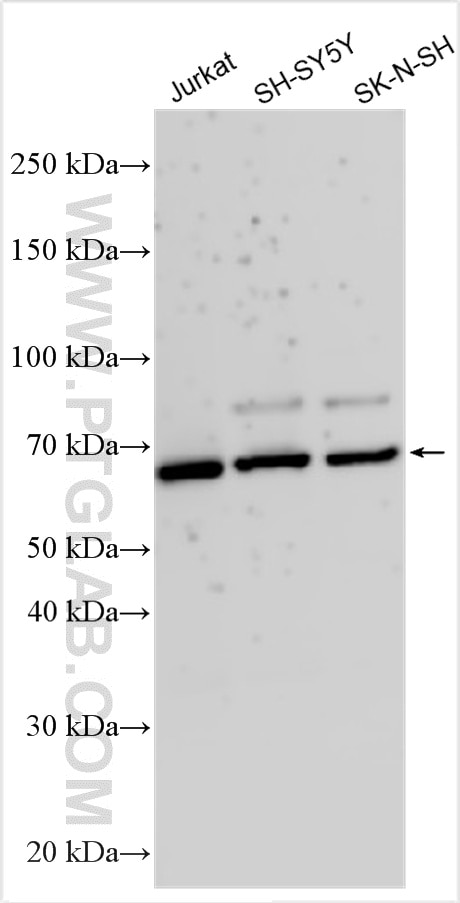Tested Applications
| Positive WB detected in | Jurkat cells, SH-SY5Y cells, SK-N-SH cells |
Recommended dilution
| Application | Dilution |
|---|---|
| Western Blot (WB) | WB : 1:500-1:3000 |
| It is recommended that this reagent should be titrated in each testing system to obtain optimal results. | |
| Sample-dependent, Check data in validation data gallery. | |
Product Information
31064-1-AP targets STK39 in WB, ELISA applications and shows reactivity with human samples.
| Tested Reactivity | human |
| Host / Isotype | Rabbit / IgG |
| Class | Polyclonal |
| Type | Antibody |
| Immunogen | STK39 fusion protein Ag34503 Predict reactive species |
| Full Name | serine threonine kinase 39 (STE20/SPS1 homolog, yeast) |
| Calculated Molecular Weight | 59 kDa |
| Observed Molecular Weight | 68 kDa |
| GenBank Accession Number | BC166614 |
| Gene Symbol | STK39 |
| Gene ID (NCBI) | 27347 |
| Conjugate | Unconjugated |
| Form | Liquid |
| Purification Method | Antigen affinity Purification |
| UNIPROT ID | Q9UEW8 |
| Storage Buffer | PBS with 0.02% sodium azide and 50% glycerol, pH 7.3. |
| Storage Conditions | Store at -20°C. Stable for one year after shipment. Aliquoting is unnecessary for -20oC storage. 20ul sizes contain 0.1% BSA. |
Background Information
STK39 (Serine/Threonine Kinase 39) is a proline- and alanine-rich Ste20-related kinase (also named as SPAK), which is composed of a short N-terminal proline and alanine repeats (PAPA box), a kinase catalytic domain and a C-terminal regulatory domain (PMID: 16382158). In mammalians, STK39 plays an important role in ion homeostasis by regulating the cation chloride cotransporters' activities, which is crucial for the modulation of renal salt transport and blood pressure (PMID: 33500714). Notably, STK39 is also implicated in the regulation of tumor cell proliferation, migration, and invasion in multiple cancers, including osteosarcoma and cervical cancer (PMID: 34335956).
Protocols
| Product Specific Protocols | |
|---|---|
| WB protocol for STK39 antibody 31064-1-AP | Download protocol |
| Standard Protocols | |
|---|---|
| Click here to view our Standard Protocols |



